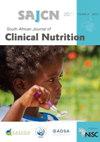营养知识、态度、信仰和实践:南非自由邦省城乡成年人的比较
IF 0.6
Q4 NUTRITION & DIETETICS
引用次数: 1
摘要
本文章由计算机程序翻译,如有差异,请以英文原文为准。
Nutrition knowledge, attitudes, beliefs and practices: a comparison of urban and rural adults in the Free State province of South Africa
Objective: A study was undertaken to explore the differences in nutrition knowledge, attitudes, beliefs and practices and their correlations among adults in both urban and rural communities in the Free State province of South Africa. Design: This study forms part of the cross-sectional Assuring Health for All in the Free-State (AHA-FS) study. Setting: The AHA-FS study is conducted in urban and rural parts of the Free State province of South Africa. The rural and urban stages of the study were conducted in 2007 and 2009, respectively. Subjects: The sample included 846 adult household members, aged between 25 and 65 years, from both rural and urban areas of the Free State province. Outcome measures: Nutrition knowledge, attitudes, beliefs and practices were measured. Results: The sample included predominantly females (78.2%). Rural adults had significantly better nutrition knowledge (p < 0.001), positive attitudes (p < 0.001) and positive beliefs (p < 0.001) and their nutrition knowledge and attitudes (r = 0.27, p < 0.001), nutrition knowledge and beliefs (r = 0.16, p < 0.001), and nutrition attitudes and beliefs (r = 0.38, p < 0.001) were significantly correlated with each other. However, nutrition knowledge, attitudes and beliefs were not correlated with nutrition practices among our sample in either the urban or rural setting. Conclusion and implication: The results of the current study confirm that relevant and culturally acceptable nutrition education interventions for translating nutrition-related knowledge, attitudes and beliefs into practices are required.
求助全文
通过发布文献求助,成功后即可免费获取论文全文。
去求助
来源期刊

South African Journal of Clinical Nutrition
NUTRITION & DIETETICS-
CiteScore
2.50
自引率
9.10%
发文量
21
期刊介绍:
1.The Journal accepts articles from all basic and applied areas of dietetics and human nutrition, including clinical nutrition, community nutrition, food science, food policy, food service management, nutrition policy and public health nutrition. 2.The Journal has a broad interpretation of the field of nutrition and recognizes that there are many factors that determine nutritional status and that need to be the subject of scientific investigation and reported in the Journal. 3.The Journal seeks to serve a broad readership and to provide information that will be useful to the scientific community, the academic community, government and non-government stakeholders in the nutrition field, policy makers and industry.
 求助内容:
求助内容: 应助结果提醒方式:
应助结果提醒方式:


